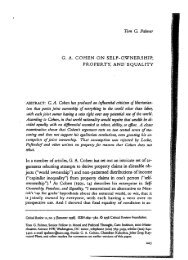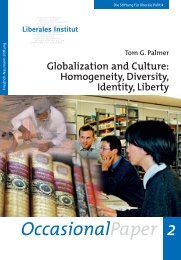Are Patents and Copyrights Morally Justified? - Tom G. Palmer
Are Patents and Copyrights Morally Justified? - Tom G. Palmer
Are Patents and Copyrights Morally Justified? - Tom G. Palmer
Create successful ePaper yourself
Turn your PDF publications into a flip-book with our unique Google optimized e-Paper software.
834 HarvardJournal of Law & Public Policy [Vol. 13<br />
they became his private right.”~<br />
If the hinge to a Lockean labor theory of property, then, is<br />
ownership in ourselves (as I believe it is), the fact that his two<br />
additional supplementary arguments point toward a form of<br />
“property” that would infringe on our ownership in ourselves<br />
(as copyrights <strong>and</strong> patents do) indicates that they should be detached<br />
from the argument from self-ownership as contradictory<br />
to it. If one wished to insist on thejustice of intellectual property<br />
claims, ownership rights in ourselves would have to be rejected<br />
as a foundation for property <strong>and</strong> independent<br />
arguments offered for rewarding moral desert based on labor.<br />
This is a difficult task, <strong>and</strong> one that has not been adequately<br />
undertaken, for reasons that Hume, Kant, <strong>and</strong> others have<br />
pointed out: desert has no principle, that is, no readily available<br />
<strong>and</strong> intersubjectively ascertainable measure. 65 Such an inherently<br />
subjective st<strong>and</strong>ard provides a poor foundation for the<br />
abstract <strong>and</strong> general rules that guide conduct in a great society.<br />
66 In a great society, not all labor is rewarded; 67 <strong>and</strong> not all<br />
of the rewards to labor are in the form of property rights. 68<br />
Our ownership rights in ourselves are based on our natural<br />
freedom, <strong>and</strong> are indeed synonymous with it; they cannot rest<br />
64. Id. at 830.<br />
65. As DavidHume notes,<br />
‘Twerebetter, no doubt, that every onewere possess’d ofwhat is most suitable<br />
to him, <strong>and</strong> proper for his use: But besides, that this relation offitness may<br />
be common to several at once, ‘tis liable to so manycontroversies<strong>and</strong>men are<br />
so partial <strong>and</strong> passionate injudging of these controversies, that such a loose<br />
<strong>and</strong> uncertain rule wou’d be absolutely incompatibLe with the peaceof human<br />
society.<br />
D. HUME, A TRa~vnsEOF HUMAN NATURE 502 (P. Nidditch ed. 1978); see also F. HAYEK,<br />
THE FATAL CONCEIT: THE ERRORS OF SOCIALISM 78-75 (1989).<br />
66. Frank Knight has characterizedthe patentsystem as “an exceedingly crudeway<br />
of rewarding invention,” for<br />
as the thing works out, it is undoubtedly a very rare <strong>and</strong> exceptional case<br />
where the really deservinginventorgets anything like a fair reward. Ifanyone<br />
gains, it is somepurchaser ofthe invention or at best an inventorwho adds a<br />
detail or finishing touchthat makes an idea practicable wherethe real work of<br />
pioneering <strong>and</strong> exploration has been done by others.<br />
F. KNIGHT, RISK, UNCERTAINTY, AND PRoFIT 372 (1921).<br />
67. Indeed, often the greatest rewards go to those who have—inthe usual sense of<br />
the word—labored theleast. We may owemore to the laziest among us: to the person<br />
who was too lazy to carry loadsby h<strong>and</strong> <strong>and</strong> cameupon the idea of using a wheelbarrow,<br />
for example. Attempts to reducesuch differentials in productivity to asubstrata of<br />
undifferentiated labor are inherendydoomed, as the failed attempt ofMarxist systems<br />
indicates.<br />
68. The rewardto labor for inventiveness in marketing, for example, is greatersales<br />
or market share, not property rights in marketing techniques or (least plausibly) in<br />
market share.











